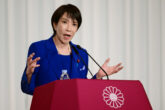February 24, 2017
Beyond palace intrigue: How North Korea's antics threaten US interests
Last week in Malaysia, North Korean dictator Kim Jong-un’s estranged half brother was assassinated in shockingly public fashion.
Apparently poisoned by two young women as he walked through Kuala Lumpur International Airport, Kim Jong-nam’s death appears to be the latest example of his tyrannical brother’s enthusiasm for violence that is both bizarre and cruel.
Yet Kim Jong-un’s murderous antics are not merely palace intrigue; his brother’s death is the latest in an effort to cleanse the North Korean government of people with whom the international community could quietly communicate, or even exert influence. Kim Jong-un is ruthlessly isolating himself and his government from the outside world — and in so doing, further deepening the threat faced by the United States and its allies.
Read the full article at The Hill.
More from CNAS
-
India-EU Trade Deal: A New Superpower Pact | PM Modi Holds Talks With EU Leaders
Lisa Curtis, Director of the Indo-Pacific Security Program at the Center for a New American Security, joined CNN News18 to discuss the recent India-EU trade deal. Watch the f...
By Lisa Curtis
-
Japan Wants Calm, China Not So Much
This article was originally published in Asian Military Review. One of the most serious China-Japan diplomatic crises in recent years unfolded in November after Chinese offici...
By Derek Grossman
-
America Must Salvage Its Relationship With India
The longer the current crisis lasts, the harder it will be to restore the relationship and the more likely it is that the two countries will lose an entire generation of progr...
By Richard Fontaine & Lisa Curtis
-
Indo-Pacific Security / Technology & National Security
AI and Policy, Both Foreign and DomesticIn an episode recorded just before Christmas, Darren interviews Janet Egan, Senior Fellow and Deputy Director of the Technology and National Security Program at CNAS, about AI...
By Janet Egan




